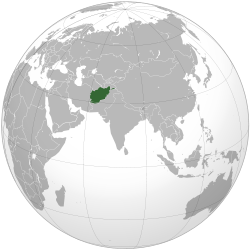Natural Resources In Afghanistan: A Neglected Dimension – Analysis
By JTW
By Matiullah (Yama) Noori
The past few decades of violent conflicts in Afghanistan crippled the country’s extractive technology and deteriorated prospects for developing a functioning mining industry. These volatile situations coupled with a high level of political and economic instability discouraged domestic and foreign economies to formally invest in mining in Afghanistan. The risks associated with such an investment were higher than the speculated profits; therefore there was no incentive for economic actors to explore this potential. However, the past few years have witnessed a positive transition. The domestic government in cooperation with foreign powers has engaged in joint initiatives to reshape the mining industry in Afghanistan.

In 2007, China agreed to launch a multibillion-dollar project in the southern province of Logar in Afghanistan to exploit the Aynak copper fields. As Daily Finance reported, “In December, 2007, China’s state-owned China Metallurgical Group Corp. (MCC) signed a $2.9 billion agreement with the Kabul government to extract copper from the Aynak deposit, one of the world’s largest unexploited copper deposits with an estimated 240 million tons of ore.” In 2010, a group of American archaeologists and pentagon specialists discovered “nearly $1 trillion in untapped mineral deposits in Afghanistan, far beyond any previously known reserves and enough to fundamentally alter the Afghan economy and perhaps the Afghan war itself, according to senior American government officials.” Moreover, very recently, on December 28, 2011, Afghanistan’s government signed the first oil extraction deal with China’s state-owned National Petroleum Corporation to explore the oil reserve in the northern provinces. The deal “calls for the Afghan government to receive 70% of the profits from the sale of the oil and natural gas. CNPC will also pay 15% in royalties, as well as corporate taxes and rent for the land used for its operations.”
The extraction of natural resources in Afghanistan provides major potential opportunities to put the country’s economy on a path of growth. These kick-starter projects indicate the significance of natural resources in the country’s economy. The revenues from these natural assets, if allocated effectively and efficiently, can shape and determine the structure of the country’s economy. It can help enhance the mode of domestic production and diversify the country’s export industry, which currently relies heavily on seasonal agricultural commodities. These efforts enable the country to develop an import substitution industry through which the country can produce most of those commodities such as petroleum and natural gas it is now importing from neighbouring countries.
In addition to these positive structural impacts, these projects can also alter the condition of local people. Projects of such magnitude can create jobs, increase the rate of employment, and provide facilities of different kinds. These positive results are however not secured by default. In other words, the extraction of natural resources does not automatically result in a prosperous outcome; they can be harnessed only if there is a sound and functioning system in place, a system that is capable of mobilizing revenues in an effective and efficient way.
How then can we assure that the revenues from these natural resources are allocated in an appropriate way?
As opposed to other private initiatives where the role of the government is very peripheral, the extraction of natural resources necessitates a central role for the government. It does so because of the specific nature of these resources and the unique ways in which they can be possessed. The government has only custodial rights on behalf of citizens, while the ownership of rights is shared collectively by the citizens. Therefore, the government must manage these natural assets in its custody in such a way as to maximize their value to citizens.
Given the unique form of ownership of these resources and their critical importance to the development of the country’s economy, the role and responsibility of the government becomes very crucial. There are several policy avenues open for the government through which it can proceed to utilize the revenues. The government may decide to use these revenues for asset acquisition or investment. In any event the guiding questions must be: What kind of assets should be acquired that will benefit every citizen as opposed to a particular group of economic or political elites? Or in which sector that will stabilize the people’s well-being should the revenues be invested in? Whatever the set of policies may be, the government must place people’s economic safety at the very top of its motives.
In the case of Afghanistan, the matter becomes more complex. There are several priorities that must be tackled and various types of needs that must be satisfied. The government’s responsibility increases as it not only has to accurately identify but also categorize and tackle those needs on the basis of severity. Of course, good governance is a necessary precondition for the proper allocation of these resources as there is a positive correlation between good governance and sound economic policies. In other terms, the better the system, the more society is able to harness the potential value of its natural assets. In addition to good governance, a productive natural resource industry also requires the convergence of elite interests with that of the ordinary citizens. If the right to own and extract these natural assets is appropriated to only a particular group of the elite, the outcomes will be far more devastating. Natural resources in developing countries with poor governance are double-edged instruments. They unleash forces that could be constructive or destructive depending on the conditions in which they are exploited. They could exacerbate existing problems if their extraction does not take place under these right circumstances.
Matiullah (Yama) Noori, London
